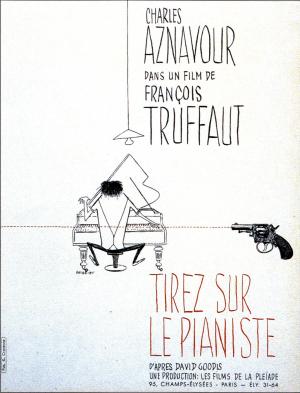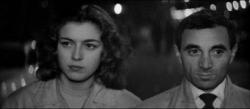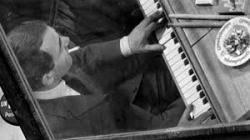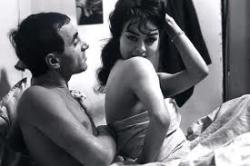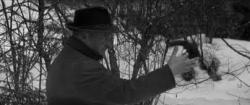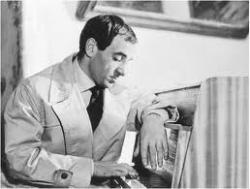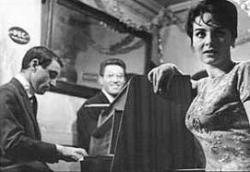Truffaut in the key of fun
By Michael Roberts
'In love, women are professionals, men are amateurs.' ~ François Truffaut
After the stellar triumph of his debut, the deeply personal The 400 Blows, François Truffaut followed up with one of the oddest entries in his entire oeuvre, Shoot The Piano Player. To see it at this distance is to experience it primarily as a piece of fun and to be engaged by its playfulness rather than focus on its limitations in terms of being a 'Truffaut' film that is unrepresentative of his wider body of work. The film's disparate strands reveal a few contradictory threads that Truffaut does not fully keep in balance, but the overall effect is still a striking and original take on his version of an offbeat 'crime' film, hilariously he said that during the filming he discovered he didn't like gangsters, and so he weighted the picture toward the comedy elements! Filmmaking on the run.
Truffaut cast French singing legend Charles Aznavour as Charlie, the nightclub piano player whose brother Chico (Albert Remy) drops in to seek help and shelter as he's on the run from a pair of criminals who he's double crossed. Charlie is reluctantly dragged into the intrigue, and so too is Léna (Marie Dubois), a sweet waitress at the nightclub who is keen on Charlie, and as she tries to bring the withdrawn Charlie out of his shell she has to incorporate the attentions of the pursuing criminals. Léna also knows that Charlie is a famous ex-concert pianist who has left that life behind for tragic reasons, and she's determined to have him return to the limelight and stop playing the seedy nightclub bar. Charlie has a young son who is looked after by the hooker in the next door apartment (Michele Mercier) who occasionally shares his bed, and the boy leads the criminals to Charlie's brother.
From the outset Truffaut signals this in not your normal gangster film, he opens with a shot of the inner workings of a piano being played, Georges Delerue delightful theme filling the air, as if he intends to go deep into what transforms an object to a 'piece of art', showing how it works in translating solid mechanics into abstract tones. In the ethos of the Nouvelle Vague, where 'everything is possible', the showing of how cinema operated was not a thing to be discouraged so the motif fits the more postmodernist of Truffaut's contemporaries, if it's not something that would normally be associated with Truffaut himself. The action jumps to a conventional chase scene where Chico is being pursued by a car, he bumps into a pole and is helped to his feet by a stranger. They then have a deep and lengthy conversation about the nature of love, 'marriage is a question of freedom', and it's as if we're in another film. A scuffle at the nightclub with the criminals is deflated by another comic moment, where Truffaut again indicates he's playing with tone and filmic devices by putting French subtitles under the French audio. Charlie shyly walks Léna home, his voiceover out of sync with his actions. The criminals pickup Charlie and Léna and pass a truck with an advertisement poster for Du Cinema, a cinema magazine. A throwaway line from one of the thugs is 'May my mother keel over this instant if I'm lying', and Truffaut cuts away to exactly that. The ironic self awareness of 'movie' nudity of a girl in bed, 'this is how you do it in movies' says Charlie as he covers her breasts with the sheet.
As playful as the film is with all kinds of cinematic conjuring it's essentially a film about love, specifically in Truffaut's view the power women have over men, it's a theme he returns to many times in his work. Charlie is shy and not confident, the women in the piece are the opposite. The flashback to Charlie's concert pianist days shows how his wife Thérèse (Nicole Berger) ensured his career success by her actions and not his talent, and she even had him doing a press conference on 'How to Conquer Shyness'. Léna is the one to drive his return to the concert stage, a plan to which he readily acquiesced, and even when he has to fight for his life against the jealous bar owner, he quits mid-fight, only to have events again overtake him. Michele is the prostitute sex partner who decides for him what night he will sleep with her, and he's compliant as usual. It's Charlie's ineffectiveness that sees the wheel turn full circle until we are back where we started, Charlie without a strong woman and falling into an unfulfilling life he's not assertive enough to change himself.
Raoul Coutard continued his amazing run of achievements with the new wave directors by shooting the film in his fluid and stylish manner, his hand held action and mastery of movement much in evidence. Coutard and Truffaut would make their masterpiece with their next collaboration, the sublime Jules et Jim. Charles Aznavour mastered the 'hangdog' expression needed for the hapless pianist, and as with many of Truffaut's best films it's the women who shine, all three main characters are fantastic, with Marie Bubois very affecting as the romantic Léna, and Nicole Berger excellent as the emotional wife. The two thugs represent a kind of Keystone Kops aspect as Truffaut never let's the 'noir' part of his gangster hommage take hold, preferring to undercut any violence with comedy, and when the violence does become darker, the comedy does too.
Truffaut wrong footed everyone with this film, including the public, who at the time didn't relate to the quirky and slightly anarchic form the piece took, and missed all the 'in' jokes that were peppered through it for the enjoyment of cinephiles. Truffaut took the lesson of the failure to heart and invested heavily emotionally and personally in his next film, one that would make or break his career. He made Jules et Jim, the rest is history. Shoot the Piano Player stands as an offbeat anomaly but a fun divertissement with much to enjoy. It has a typically French attitude to romance - fatalistic, melancholy and ambivalent at one end, and absolutely charged and emotional at the other, it's this duality that Truffaut and other French filmmakers tapped into that so intrigues the viewer and makes even their lesser works special and well worth the effort.
